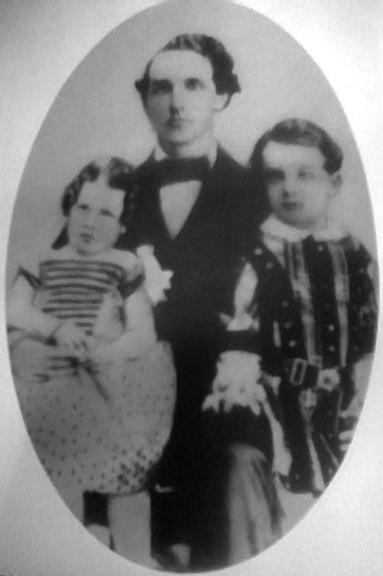
The American Civil War Biographies: Franklin Gaillard (1829-64)

Figure 1.--This is what looks like an ambrotype of Franklin Gaillard's two children taken just before the Civl War (about 1858). They look to be about 3-5 years old. The girl wears a standard dress. The boy wears what looks like a plaid tunic suit with velvet stripes. Lt. Col Gaillard is of historical interest because of the letters he wrote home to his children. They provide fascinating insights into how a mid-level Confederate officer saw the miliary campaigns of the Army of Northern Virginia as they unfolded.
|
|
Franklin Gaillard was a Lt. Col in the Army of Northern Virginia, the 2nd South Carolina Infantry. He was a competent officer receiving rapid promotions during the War. He is of interest to Civil War historians primarily because he was a prolific letter writer. His descriptive and insightful letters of the various campaigns in his letters home to his two children are valuable historical documents. Franklin was born to planter parents in Pineville, a small town north of Charleston, South Carolina (1829). We know little of his childhood. From an early point he proved to be an excellent student and fine writer. His family moved to Alabama, but Gaillard remained in South Carolina with his uncle in Fairfield County. This was a county in north-central South Carolina, just north of the state capital in Columbia. The county seat was Winnsboro. Franklin attended Mount Zion Academy in Winnsboro. As an older student, Gaillard developed a strong interest in politics. He graduated from South Carolina College (today's University of South Carolina). His academic skills made him the class valedictorian (1849). He then took off for the California gold fields where he spent 3 years. When he returned to his uncle's home without making his fortune, he purchased the local Winnsboro Register (about 1852). This was a small newspaper with a strongly southern democratic meaning pro-slavery outloook. And the readership shared that opinion. He married that same year. The young couple had two children, a boy and girl. His wife tragically died (1856). Gaillard's journalistic work in Winsboro was noted. He accepted an offer to become the chief editor of the Carolinian, an important daily state newspaper. As a result, just as the American sectional crisis was reaching a critical point, Gaillard was thrust into the middle of the public discourse in his state, the most radical of all the southern states. He was one of the many South Carolinians who were outraged over perceived insults to Southern society from the increasingly important Abolitionist movement in the North. Secession of course was the inevitable result and South Carolina was the first state to seceed. The state was where in Charleston harbor that secession became a war. Gaillard had no military experience and owned no slaves, but his family did and he grew up around slaves. South Carolina was seen in the North for good reason as the 'Hot bed of secession'. After playing an important role in the secession debate, he felt a need to serve his state and fight the war he helped bring asbout. He had connections with important state politicans and this got him an officer’s commisdsion. He mustered into Company A of what would become the 2nd South Carolina Volunteer Regiment as a lieutenant. He took an immediate liking to military life and proved good at it. The Regiment played important roles in the major battles of 1862 and early 1863. By the time of Gettysburgh he was had been promoted to lieutenant colonel of the regiment, commanded by Colonel John D. Kennedy. Lt. Col. Gaillard was very ethusiastic about the offensive into Pennsylvania, thinking that with Lee in command that they would achieve more important victories, perhaps ending the War. Getttysburg was a shock. Although involved in Pickett's Charge as part of Garnett's brigade, he survived the battle. He was, however, killed a year later in the Wilderness (1864). His two children were left orphans, having lost both parents. The family unlike many Civil War orphans was in a position to care for them.
CIH -- Civil War

Navigate the CIH Civil War Section:
[Return to Main Civil War biography page]
[Return to the Main Civil War page]
[Return to the Importance]
[Return to the American 1850s families]
[About Us]
[Biographies]
[Campaign]
[Causes]
[Emancipation]
[Families and youth]
[Fiscal policy]
[Formations and units]
[Law]
[Railroads]
[Reconstruction]
[Slavery]
[Soldiers]
[Uniforms]
[Weaponry]
[Return to the Main Civil War page]
[Lost Cause]
[Segregation]
[Civil Rights movement]
[Return to CIH Home page]
Created: 8:13 PM 10/9/2016
Last updated: 8:13 PM 10/9/2016



